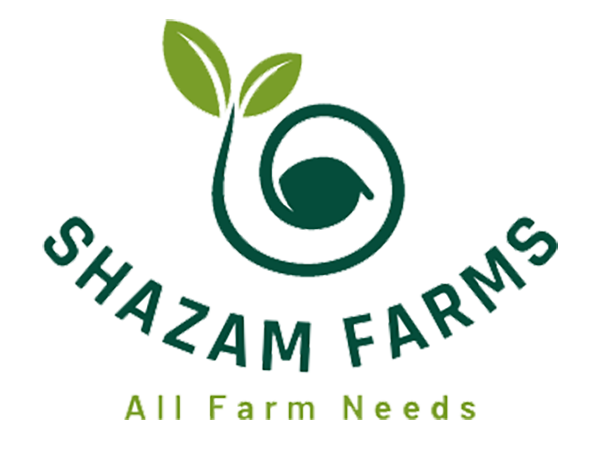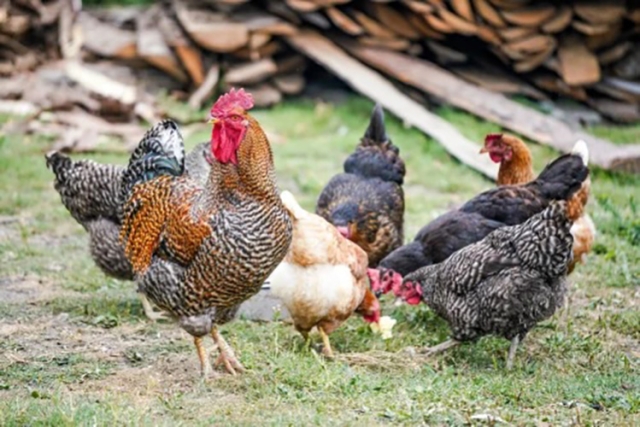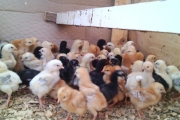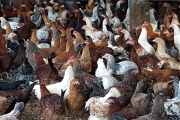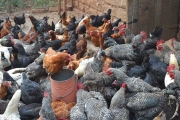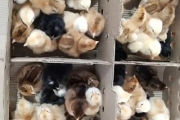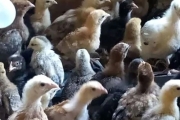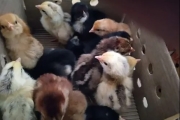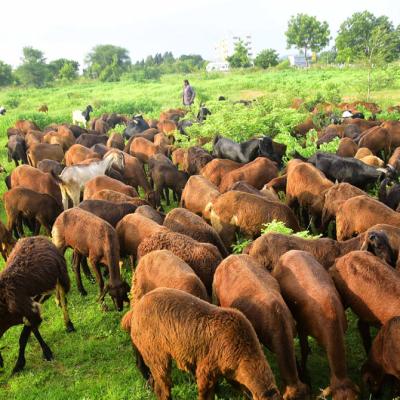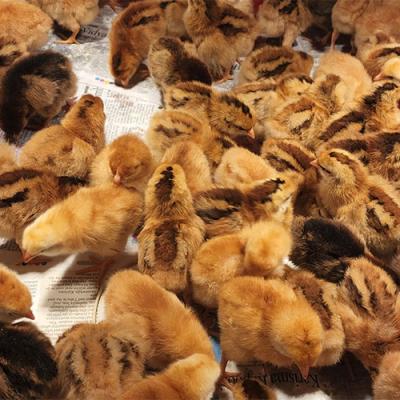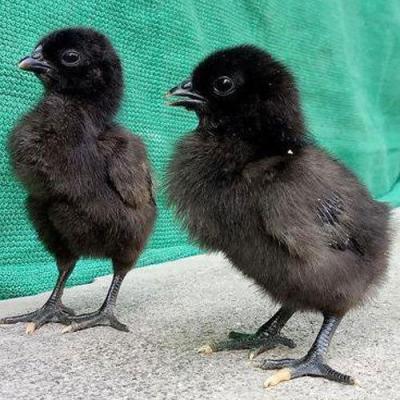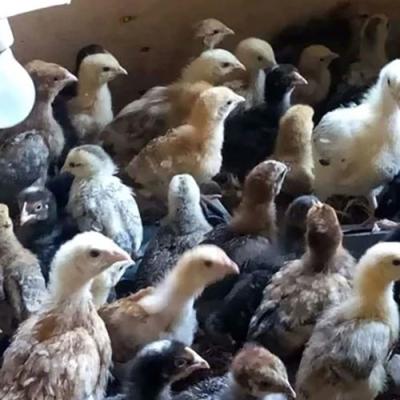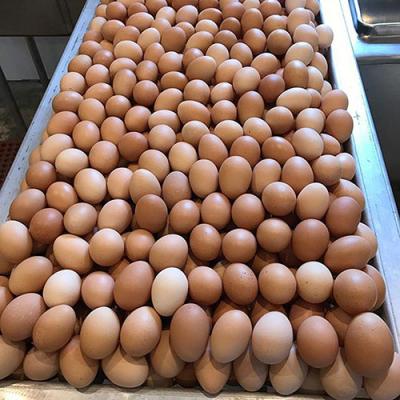FFG Male & Female Mix
Introduction to FFG (Kroiler) Poultry
FFG (Kroiler) poultry, a hybrid breed combining the best traits of various poultry species, has revolutionized the commercial poultry industry with its exceptional growth rates, efficient feed conversion, and high meat quality. This breed is tailored for maximizing profitability in poultry farming operations, offering farmers a reliable solution to meet market demands effectively.
Key Features and Characteristics
FFG (Kroiler) poultry is distinguished by several key features that make it a preferred choice for commercial poultry farming:
-
Rapid Growth: FFG (Kroiler) poultry exhibits accelerated growth rates, achieving market-ready weights in significantly shorter periods compared to traditional breeds. This trait enhances production efficiency and profitability by reducing feeding duration and optimizing production cycles.
-
Feed Efficiency: Known for its efficient feed conversion, FFG (Kroiler) poultry consumes feed economically while converting it into meat efficiently. This characteristic not only lowers production costs but also supports sustainable farming practices by minimizing resource utilization.
-
Meat Quality: The meat from FFG (Kroiler) poultry is renowned for its superior quality, characterized by tender texture, juiciness, and rich flavor profiles. This quality attribute meets consumer preferences and enhances market competitiveness, positioning FFG (Kroiler) poultry as a premium choice in the poultry meat sector.
-
Adaptability: FFG (Kroiler) poultry demonstrates adaptability to various farming conditions and management systems, making it suitable for both intensive and semi-intensive farming operations. This adaptability ensures consistent performance and productivity across different geographical regions and farming environments.
Nutritional Requirements and Feed Management
Effective feed management is critical to maximizing the growth and productivity of FFG (Kroiler) poultry. Understanding their nutritional requirements and implementing appropriate feeding strategies are essential for achieving optimal performance and profitability:
-
Feed Intake and Composition: FFG (Kroiler) poultry has specific nutritional needs at different stages of growth. A balanced diet rich in proteins, vitamins, and minerals supports their rapid growth and development. The feed composition should be carefully formulated to meet these requirements while considering cost-effectiveness and nutrient utilization efficiency.
-
Feeding Program: Implementing a well-structured feeding program ensures consistent growth and health outcomes for FFG (Kroiler) poultry. Feeding schedules should be tailored to accommodate their growth phases, adjusting feed formulations and quantities accordingly to promote efficient feed conversion and minimize wastage.
-
Water Management: Access to clean and freshwater is essential for the health and productivity of FFG (Kroiler) poultry. Proper water management practices, including regular cleaning of water sources and ensuring continuous access to fresh water, are crucial for maintaining hydration and supporting metabolic functions.
Housing and Environmental Requirements
Creating optimal housing conditions is integral to maximizing the welfare and performance of FFG (Kroiler) poultry. Proper housing design and environmental management practices contribute to their health, comfort, and productivity:
-
Housing Design: The housing structure should be well-ventilated, providing adequate airflow to regulate temperature and humidity levels. Proper insulation and ventilation systems help mitigate heat stress during warmer months and maintain optimal thermal comfort year-round.
-
Temperature Management: FFG (Kroiler) poultry thrive in temperatures ranging from 18°C to 30°C. Implementing temperature control measures, such as heating or cooling systems, ensures that poultry remain comfortable and productive, minimizing stress-related issues and supporting optimal growth rates.
-
Bedding and Cleanliness: Maintaining clean bedding materials and regular sanitation practices in the poultry housing environment is essential for preventing disease outbreaks and promoting overall hygiene. Proper waste management systems should be in place to manage litter effectively and maintain a clean, healthy living environment for FFG (Kroiler) poultry.
Health Management and Disease Prevention
Ensuring robust health management practices is fundamental to safeguarding the well-being and productivity of FFG (Kroiler) poultry. Proactive disease prevention strategies and routine health monitoring protocols are critical components of effective poultry health management:
-
Vaccination Programs: Implementing a comprehensive vaccination schedule tailored to the specific health needs and disease risks of FFG (Kroiler) poultry helps prevent infectious diseases and minimizes the spread of pathogens within the flock. Vaccination protocols should be developed in consultation with poultry health professionals and adhered to diligently.
-
Biosecurity Measures: Establishing strict biosecurity measures, including controlling visitor access, disinfecting equipment, and monitoring flock health status, reduces the risk of disease introduction and transmission. Biosecurity protocols should be integrated into daily farm operations to maintain a secure and disease-free environment for FFG (Kroiler) poultry.
-
Health Monitoring: Regular health assessments and monitoring of flock behavior, feed consumption, and growth performance enable early detection of health issues and prompt intervention. Timely veterinary care and diagnostic testing facilitate proactive management of poultry health and minimize potential economic losses associated with disease outbreaks.
Economic Benefits and Profitability
The adoption of FFG (Kroiler) poultry in commercial poultry farming operations offers numerous economic benefits and enhances overall profitability:
-
Optimized Production Efficiency: FFG (Kroiler) poultry's rapid growth and efficient feed conversion rates contribute to accelerated production cycles and reduced time to market. This optimization improves production efficiency and enables farmers to meet market demands promptly.
-
Cost-Effective Feed Utilization: Efficient feed conversion in FFG (Kroiler) poultry lowers feed costs per unit of meat produced, enhancing cost-effectiveness and profitability for poultry farmers. This economic advantage allows farmers to achieve higher profit margins while maintaining competitive pricing in the market.
-
Market Competitiveness: The superior meat quality of FFG (Kroiler) poultry meets consumer preferences for tender, flavorful meat products. This market advantage enhances product competitiveness and consumer loyalty, positioning FFG (Kroiler) poultry as a preferred choice among poultry meat consumers.
-
Sustainable Farming Practices: By optimizing resource utilization and minimizing environmental impact, FFG (Kroiler) poultry contributes to sustainable farming practices. Efficient feed management, reduced production cycles, and improved waste management support environmental sustainability and long-term agricultural viability.
Integration into Commercial Poultry Farming
Integrating FFG (Kroiler) poultry into commercial poultry farming operations requires strategic planning, comprehensive management practices, and adherence to industry standards:
-
Farm Planning and Infrastructure: Designing farm facilities and infrastructure to accommodate the specific needs of FFG (Kroiler) poultry promotes efficient operations and maximizes productivity. Considerations include housing design, feeding systems, water management, and environmental control measures tailored to support poultry health and welfare.
-
Management Protocols: Implementing robust management protocols, including feeding programs, health monitoring, and biosecurity measures, ensures optimal performance and disease prevention. Regular training and ongoing education for farm personnel promote adherence to best practices and maintain high standards of poultry care and management.
-
Market Analysis and Consumer Trends: Conducting market analysis and monitoring consumer trends in poultry meat preferences guide product development and marketing strategies. Understanding market demands for premium-quality poultry products enables farmers to align production practices with consumer preferences and capitalize on market opportunities effectively.
Future Trends and Innovations in FFG (Kroiler) Poultry Farming
The future of FFG (Kroiler) poultry farming is marked by ongoing advancements in breeding techniques, nutrition management, and technological innovations aimed at enhancing productivity, sustainability, and profitability:
-
Genetic Improvement: Continued genetic research and selective breeding programs aim to further enhance the performance traits and genetic potential of FFG (Kroiler) poultry. Genetic advancements contribute to improved growth rates, disease resistance, and meat quality attributes, supporting continued innovation in poultry breeding practices.
-
Nutritional Innovation: Innovations in feed formulation and nutritional supplements optimize nutrient utilization and promote overall poultry health and performance. Research-driven approaches to feed efficiency and dietary management contribute to cost-effective production practices and environmental sustainability in poultry farming.
-
Technological Integration: The integration of technology, including automated feeding systems, environmental monitoring sensors, and data analytics platforms, enhances operational efficiency and decision-making capabilities on poultry farms. Technological innovations streamline farm management processes, improve resource management, and facilitate real-time monitoring of poultry health and performance metrics.
Conclusion
FFG (Kroiler) poultry represents a cornerstone of modern commercial poultry farming, characterized by its exceptional growth rates, efficient feed conversion, and superior meat quality attributes. This hybrid breed's adaptability, performance reliability, and economic benefits make it a preferred choice among poultry farmers seeking to optimize productivity and profitability in competitive markets. By integrating FFG (Kroiler) poultry into their operations and implementing best practices in management, nutrition, health, and sustainability, farmers can achieve sustainable growth, meet consumer demands, and contribute to the advancement of the poultry industry.
- Hybrid breed optimized for commercial meat production.
- Known for rapid growth rates compared to traditional poultry breeds.
- Efficient feed conversion, reducing overall feed costs.
- Superior meat quality with tender texture and rich flavor.
- Adaptable to various farming conditions and management systems.
- Requires well-ventilated housing with temperature control (18°C to 30°C).
- Specific nutritional requirements at different growth stages.
- Comprehensive health management protocols including vaccination and biosecurity measures.
- Enhances production efficiency with shortened growth cycles.
- Supports sustainable farming practices through resource efficiency and market competitiveness.
